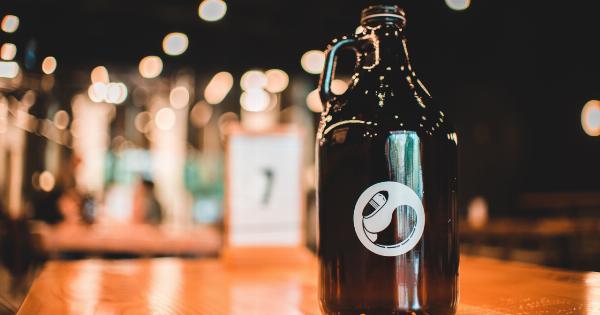Water is essential for our bodies to function properly. It helps regulate our body temperature, lubricate our joints, aid in digestion, and flush out toxins. But did you know that staying hydrated can also help you avoid ending up in the drunk tank?.
The link between dehydration and alcohol
Alcohol is a diuretic, which means it increases urine production and can lead to dehydration. When you consume alcohol, your body tries to get rid of it as quickly as possible, resulting in frequent trips to the bathroom.
This excessive urination can cause dehydration if you fail to replenish your fluids adequately.
How dehydration affects your body
Dehydration can have several negative effects on your body, including:.
- Impaired cognitive function
- Decreased coordination
- Fatigue and dizziness
- Increased heart rate
- Increased body temperature
These symptoms can make simple tasks more challenging and significantly impair your judgment and decision-making abilities. When combined with the effects of alcohol, dehydration can quickly escalate a night of drinking into a dangerous situation.
The drunk tank: What is it?
For those unfamiliar with the term, the drunk tank is a colloquial way of referring to the holding cell or detoxification facility where individuals who have been arrested for public intoxication are temporarily held.
It’s an unpleasant and potentially dangerous environment.
How staying hydrated can keep you out of the drunk tank
By drinking enough water before, during, and after consuming alcohol, you can significantly reduce your chances of ending up in the drunk tank. Here’s how:.
1. Hydration slows down alcohol absorption
When you drink alcohol on an empty stomach, it is absorbed quickly into your bloodstream. However, when you are properly hydrated, the absorption process is slowed down.
This means that you can enjoy your drinks without quickly becoming intoxicated, reducing the risk of engaging in reckless behavior that could land you in trouble.
2. Water helps dilute alcohol in your system
Alcohol is metabolized by your liver, but this process takes time. By drinking water, you can help dilute the alcohol in your system and assist your liver in breaking it down more effectively.
This can prevent alcohol from reaching dangerously high levels in your blood, reducing the risk of severe intoxication and potential legal consequences.
3. Hydration aids in alcohol elimination
Water helps flush alcohol out of your system through urine. By staying hydrated, you can promote more frequent urination, which can help accelerate the elimination of alcohol from your body.
The faster alcohol is eliminated, the sooner you will sober up, reducing the chances of being arrested for public intoxication.
4. Drinking water promotes responsible drinking
When you prioritize hydration, it encourages you to pace yourself and consume alcohol more responsibly. By alternating alcoholic beverages with glasses of water, you can maintain a safer and more controlled level of intoxication.
This can help you avoid the poor decision-making and impaired judgment that often lead to arrests and potential harm.
5. Water helps prevent hangovers
Drinking alcohol can lead to dehydration, which is a common cause of hangovers.
By staying hydrated, not only can you reduce the likelihood of ending up in the drunk tank, but you can also minimize the unpleasant symptoms associated with a hangover the next day. This will allow you to wake up feeling refreshed and ready to take on the day.
The importance of responsible drinking
While staying hydrated is crucial in avoiding the negative consequences of excessive alcohol consumption, it is equally important to prioritize responsible drinking habits. Here are a few additional tips to keep in mind:.
1. Set a consumption limit
Before heading out, decide on a specific limit for the number of alcoholic drinks you’ll have. Stick to this limit and know your personal tolerance for alcohol.
Remember, every individual reacts differently to alcohol, so it’s essential to understand your limits.
2. Eat before and while drinking
Consuming food before drinking alcohol can help slow down its absorption into your bloodstream. Additionally, snacking while drinking can also help mitigate its effects.
Foods with high water content, such as fruits and vegetables, can provide additional hydration.
3. Avoid mixing alcohol and medications
Some medications can interact negatively with alcohol, intensifying its effects or causing adverse reactions. Always check the labels and consult your doctor or pharmacist before consuming alcohol while taking medication.
4. Use a designated driver
If you plan on drinking, make sure you have a designated driver or alternative transportation arranged. Never drink and drive or allow someone who is intoxicated to get behind the wheel. Putting yourself and others at risk is never worth it.
5. Know the alcohol laws in your area
Familiarize yourself with the legal drinking age, public consumption laws, and other alcohol-related regulations in your region.
Ignorance of the law is not a valid excuse, and being aware of these regulations can help you avoid unnecessary legal trouble.
In conclusion
Staying hydrated is not only essential for general well-being but also plays a crucial role in preventing unnecessary trips to the drunk tank.
By drinking enough water before, during, and after consuming alcohol, you can reduce the risk of dehydration and its detrimental effects on your body and judgment. Remember to prioritize responsible drinking practices and make informed decisions when it comes to alcohol consumption. Stay hydrated, stay safe, and enjoy your night out without ending up in the drunk tank.




























